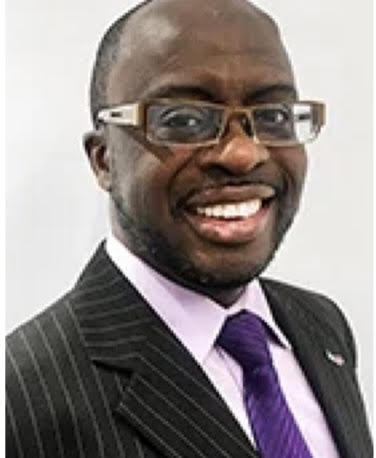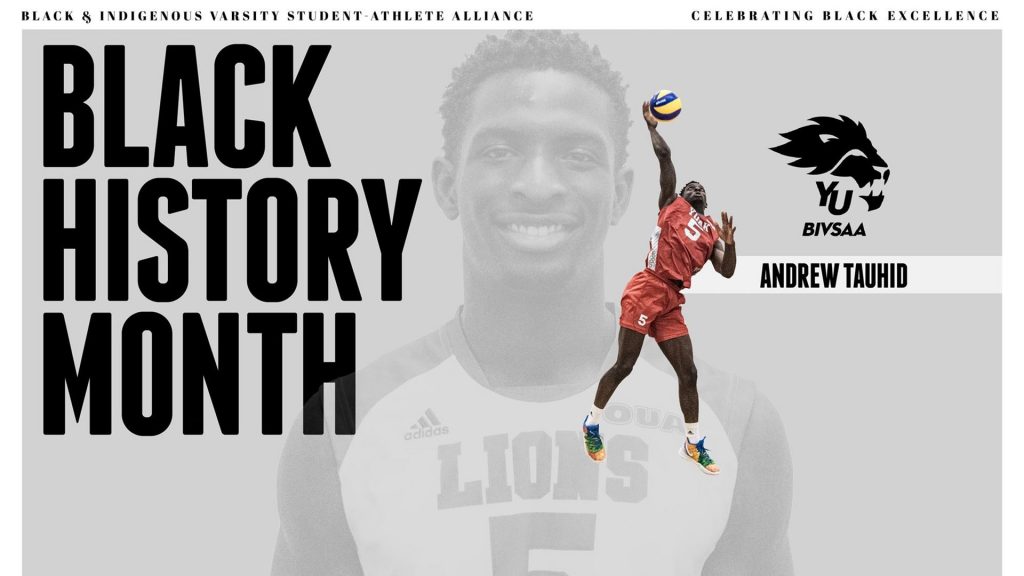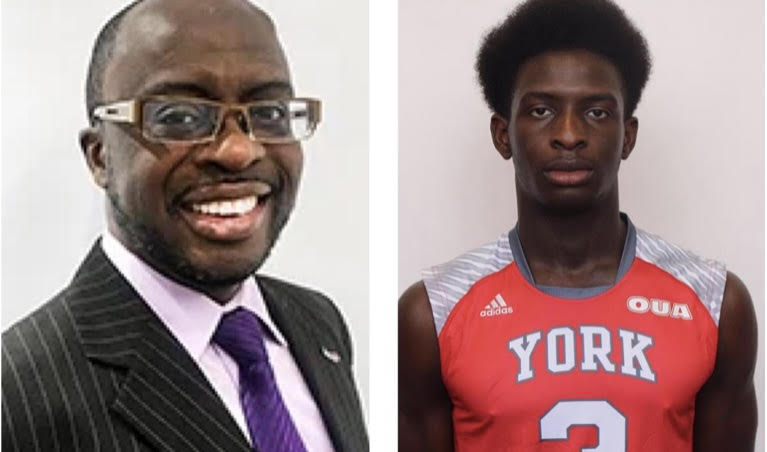Kunle Tauhid is Vice President for Eastern and Northern Ontario of Business Development Bank of Canada, BDC. While writing this month of February 2021 for BDC on the contributions of black entrepreneurs as part of the Black History Month, the son, Andrew Tauhid, in his fourth year at York University was being interviewed in the school’s publication, yorkulions.ca for the Black History Month. New Americans magazine is excited in reproducing the two publications in one:
Let’s recognize the contribution of Black entrepreneurs
By Kunle Tauhid

Kunle Tauhid has been working closely with Canadian entrepreneurs for over 15 years. As Vice President for Eastern and Northern Ontario of Business Development Bank of Canada, Kunle leads a team of experts dedicated to helping business owners grow their companies and achieve their goals with tailored financing. Originally from Nigeria, Kunle joined BDC as a Business Centre Manager in 2011 before taking on additional responsibility. He’s notably taken a leadership on the adoption of new technology. With years of experience, Kunle has acquired the skills and experience necessary for structuring financing and advisory solutions that meet the needs to entrepreneurs across every industry. In this month of February, also referred to as Black History Month, New Americans Business magazine publishes this contribution culled from the BDC website:
February is Black History Month and it’s a great time to recognize the remarkable contribution Black entrepreneurs are making to communities across Canada.
Over the years, I have worked with many Black entrepreneurs, and my own professional experiences have made me all the more impressed by their determination to overcome obstacles and build thriving businesses.
That’s why I’m proud BDC is well advanced in the creation of an action plan to better support Black entrepreneurs by providing them with financing and business advice, and by encouraging the growth of a vital Black entrepreneurship ecosystem in Canada.
We want to help more entrepreneurs to join the ranks of success stories like Marc Lafleur, CEO of Kitchener, Ontario’s TruLocal, a booming online meat vendor, and Frantz Saintellemy, President and Chief Operating Officer of LeddarTech, a fast-growing Quebec City company that designs and develops specialized microprocessors for the auto industry.
Black business owners, along with women, Indigenous, visible minorities and LGBTQ2+ entrepreneurs, have traditionally faced more challenges in starting and growing businesses, including more difficulty accessing capital.
Pandemic exacerbates challenges
The COVID-19 pandemic has exacerbated the situation, according to research from Statistics Canada. The research found that businesses owned by visible minorities, Indigenous people and women had their COVID-related requests to financial institutions rejected more frequently than the rate for all businesses.
I know what it’s like to face professional challenges. When I came to Canada from Nigeria in 2002 with my wife and two young children, we were searching for peace, security and opportunity. We found those things but getting started in our new home wasn’t easy.
In Nigeria, I had been a branch manager at a large bank, a position that came with a chauffeur-driven car. In Toronto, despite my experience and two university degrees, I was told time and again I needed Canadian experience to get a position. In some cases, my difficulties finding a job went beyond my resumé to what I perceived to be racism.
Determined to succeed
Nevertheless, I was determined to succeed. I told myself if I could put up with an icy Toronto winter, I could put up with anything. Finally, I landed a job with the Royal Bank as a teller. At 35, I was truly starting over from scratch.
It was humbling, but banking is an industry where your performance is quantifiable. You either surpass your targets or you don’t. I worked hard and moved up quickly. Eventually, I was recruited to join BDC as Business Centre Manager in the Toronto suburb of Scarborough.
I am now a Vice President and proud of the fact that BDC is committed to doing more to support Black entrepreneurs in overcoming barriers to their success. We have sought input from our partners, employees and entrepreneurs on how to best to move forward on this issue.
An early step in our efforts was the signing of the BlackNorth Initiative CEO pledge. This initiative of the Canadian Council of Business Leaders Against Anti-Black Systemic Racism commits BDC to specific actions and targets to end anti-Black systemic racism and create more opportunities for the Black community.
Companies that signed the pledge commit to seven goals, including hiring at least 5% within their student workforce from the Black community and having at least 3.5% of executive and board roles being held by Black leaders by 2025.
Mentorship and networking are key to success
Over the years of working with Black entrepreneurs, I believe there are some fundamental practices that can make the difference between success and failure for them.
The first one is to find a mentor. I have benefitted from mentoring during my career, and I have mentored many entrepreneurs. I believe guidance from someone who has successfully navigated the challenges of running a business can be invaluable in the development of an entrepreneur. If you are 18-39, a great place to find both financing and a mentor is our partner organization, Futurpreneur Canada.
It’s also important to network in an organized way by joining business organizations and getting business training, especially in financial management.
A good credit score is key to getting a loan
When it comes to obtaining a business loan, you need to build a good credit score and prepare a solid loan proposal. If you have the resources, you might want to buy an existing company that already has a proven business model, operations and customers.
Most important of all is to have clear goals for yourself and your company, and the determination to overcome the inevitable difficulties and stay the course.
Consider certifying as a minority supplier
Becoming a supplier to large companies and organizations can be a great way to quickly grow your business. Many organizations, like BDC, have supplier diversity programs that can provide you with additional visibility when bidding for projects.
Certifying as a diversity supplier will also give you access to exclusive networking opportunities and can be a great way to access the U.S. market.
Contacting organizations like the Canadian Aboriginal and Minority Supplier Council, which BDC supports, can be a good first step to consider when looking for procurement opportunities to help your business take the next step.
No matter what direction you choose, BDC will be here to help. We are taking steps to ensure we understand the reality of Black entrepreneurs and we want to make a difference, so don’t hesitate to reach out to us. (Kunle Tauhid is Vice President – Eastern and Northern Ontario of Business Development Bank of Canada)
Student Athlete Spotlight: Andrew Tauhid
Over the course of Black History Month, visitors of yorkulions.ca will read Student-Athlete Spotlights, which will profile prominent Lions student-athletes of colour. They will discuss the success they’ve achieved both on and off the field of play. This year yorkulions.ca spotlights Andrew Tauhid.

Andrew Tauhid is in his fourth year in York University and with the Lions men’s volleyball program, and has become one of the most reliable, high-impact players on the roster over the course of his career. In the 2019-20 season, Tauhid ranked 16th in the OUA and second on the team with 3.1 points per set and also had 1.21 digs per set, good for fourth on the Lions. He is a one-time OUA second-team all-star, earning the honours in 2018-19. Outside of Lions volleyball, the Toronto native coaches in youth sports with the Venom Volleyball Club in Markham, Ontario.
Tell me about your long-term career plans
So currently I’m studying Law and Society. Immediately after I’m done school I’d like to pursue a career in professional volleyball overseas for a couple years for however long my body holds up. Once I have passed the point where I can play volleyball, my goal is to return home and become a police officer. My goal originally was to be a detective, but as I’ve gotten older and done some research I’ve come to understand all the other branches that are within the police forces. So my goal is to do something in law enforcement.
Is there anything in particular that led you in the direction of law enforcement?
Yes. I read a book called Monster, and it was about an interaction an individual had with the legal system. In the book, he perceived himself to be innocent and the book was his account of interactions with people in the law enforcement system. When I was a kid, I remember student resource officers coming into our elementary schools and interacting with us, and since then I’ve learned that these kinds of appearances are about more than just introducing police officers to students, it’s about establishing trust with people at a young age so that there’s trust when they’re older. They want younger people to think about police officers as people they can trust. I saw that, I watched documentaries, read articles, and saw how the actual law enforcement system works. They consider police officers to be the front-line workers of the legal system, and that’s another appealing thing to me. Essentially, there isn’t any other career I could imagine.
You clearly have a pulse on law enforcement. Given that, what are your thoughts on the social justice events that prevailed over the course of the last year?
I’ve understood for a while that there is a stigma around policing. The public perception of officers has been salted because of bad apples. And I will preface this by saying that there are bad apples in every profession – but there are certain jobs where you can’t afford for that to be the case. A good example of that is professionals in healthcare who are responsible for people’s lives. It’s the exact same thing for police officers. They are the ones who decide if someone is able to see their family later that night. They’re responsible for whether someone is arrested, let go or dead. Some people see policing as a form of income rather than an occupation that effects outcomes in our society. In terms of what happened down south last summer, people will often ask me how I felt about that situation, and they ask the question as if this was the defining moment for Black Lives Matter. In reality, Black Lives Matter was established in 2013. But with everything occurring in the world during 2020, people had the time to make this their focus. I remember the day George Floyd died. I honestly thought people would forget about it after a week. But when Minnesota was set on fire, I realized this was going to take the world’s attention. Finally, the issue would get the attention it deserves. And it made me want to be in law enforcement even more in order to have the opportunity to change things. Not only how policing is viewed in society, but how the system works from the inside. Michael Jackson famously said, “If you wanna make the world a better place, take a look at yourself, and then make a change!” So I want to start with what I can do.
The point of the protests is to make change. What are some of the positive outcomes you would like to see from the Black Lives Matter movement?
It starts from the top and works its way down from there. We saw it on January 6 when the head of the snake said “let’s do this,” and the rest of the snake followed. And that’s how powerful leadership can be. Imagine the influence that office would have on advancing Black lives if they said anything about that. That’s what we’re looking for with Black Lives Matter. Not only accountability, but we’re looking for leadership. A guy like NDP leader Jagmeet Singh – he is a person of colour, so he understands what it’s like to be discriminated against. He gets it. And he understands how to make change in the system, but it seems like he’s being silenced. For example, when he was ejected from the House of Commons for calling another MP racist. That is an example of white privilege using the existing rules to fit their agenda. But it’s that kind of statement that results in change. Those are the kinds of steps that need to be taken. The fact is that if you have 400 years of advancement on the backs of another races, you’re going to have a level up on society. And so the result of the movement needs to level Black lives with everyone else.
This month is about Black Excellence. Given that, I want to ask you what you feel your greatest achievement is.
This is less of an actual situation and more about goal setting. I think my greatest achievement is my academic growth. Growing up, I wasn’t the greatest academically. Some people are early bloomers, some people are late bloomers. I was a five-minute late bloomer. I was very athletically involved but otherwise I always did what I needed to get by. And because of that, I was a little closed-minded with all the things I did. But when I got to university, I was able to learn a lot about myself. I became more mature. But it took a lot of failure. A whole lot! Perseverance and persistence were very valuable – working through injuries and things like that. And also, on personal growth, if I were to be involved in an incident because of the colour of my skin, before I wouldn’t know what to do or how to react. Now, I can name it, and I’m able to react properly to those situations.
Who inspires you?
I have a lot of inspirations. I’d say my role model is Bradley Beal [NBA player with the Washington Wizards]. Not only because of how well he’s playing basketball right now, but just because of the adversity. He is currently not in the greatest playing environment, and I’m one of the people who would like to see him leave his current team. But as a player, you don’t want to leave. You want to be able to work out your situation. The worst thing about that is when you’re trying to work out your situation, and you are constantly losing – and it’s even when you’re constantly losing but still playing well. And he’s in the same conversation as Michael Jordan right now [Beal is coming off 17 straight games with 25 or more points to begin the season, besting Michael Jordan’s previous record for the longest streak since the NBA/ABA merger]. How does he deal with that adversity? How does he deal with the growing pains of wanting to be successful, but being out of reach? He could score 100 points in a game and still lose. So, I get my inspiration from watching him play through that adversity.





































Leave a Reply
You must be logged in to post a comment.